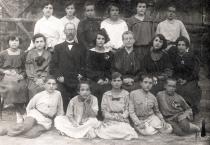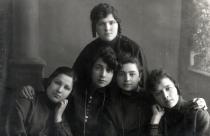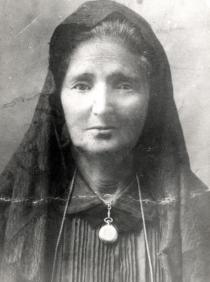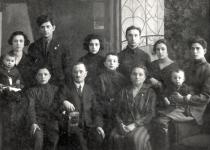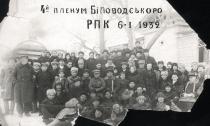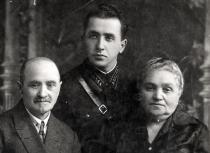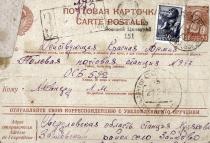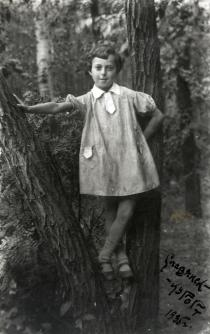
St. Petersburg
Russia
Interviewer: Bella Shevchuk
Date of interview: September 2002
Nina Lvovna is an intelligent woman of 78. She is not tall and has kind eyes.
Five months ago she buried her husband and was left completely alone.
In spite of all the bitterness, connected with the loss of her husband, with whom she lived for 40 years,
she expressed her desire to tell us about the life of her relatives.
Nina Lvovna perfectly remembers many details of her ancestors’ life and is very proud of them.
- Family background
I was born in 1924 in Rogachyov, a small town in Gomel region [today Belarus]. I don’t know if there was a maternity hospital in Rogachyov, but I was born at home, on Grandmother’s bed.
I remember Rogachyov as a very beautiful town on the bank of the Dnepr River. Many Jews lived there. I didn’t notice any anti-Semitism then. I think even more Jews lived there than Russians. The Dnepr was very beautiful, lilies bloomed on the shoals. There was a beach at the opposite bank of the Dnepr. It was possible to get there in a ferryboat. A big bridge could be seen in the distance. The bridge was of strategic significance during the war –I read about it in the newspapers.
My maternal ancestors came from this town. My grandfather, my great-grandfather and all their relatives lived there. Their last name was Goldin. My great-grandfather was a tailor. All men in their family were tailors. I cannot say exactly what the residents of the town in general were engaged in, I can only tell you about my relatives. They were craftsmen. Grandfather’s sister married a carter, but all other men in the family were mostly tailors. There must have been traders in the town too. There was a good marketplace and a lot of berries were sold there. Grandmother went to the marketplace; I have not been there.
Grandfather never told me anything about their childhood. I only know that he had two brothers who left for America, but I don’t know their names. Two other brothers left for Leningrad [today St. Petersburg]. The Germans executed Grandfather’s sister Kreina with her family in Rogachyov by shooting in 1941.
Grandfather’s name was Meilakh Goldin and Grandmother’s name was Seina-Chaya; I do not know her maiden name. I don’t know anything about her family, only that she had a sister. My grandmother perished in Lugansk [today Ukraine], where she was also executed by shooting by the Germans in 1941 or 1942. Grandmother was a stocking-maker.
When the Great Patriotic War 1 broke out, Grandfather was about 63 and Grandmother was 60, though I am not sure about it. They had six children: sons Afroim, Pavel and Semyon and daughters Serafima, Rosalia and Revekka. Afroim and Pavel were at the frontline and fought against the Germans. Afroim was awarded many orders. Pavel reached Vienna. Serafima was executed by shooting by the Germans in Rogachyov.
In the 1970s Afroim and Rosalia left for Israel, where they died later on. Semyon, Pavel and Revekka lived in Leningrad. They have also passed away by now.
Grandfather was a tailor and Grandmother was a stocking-maker. Grandmother was involved in this craft while the children were small. When they grew up, Grandfather began to make more money. He worked at first at the cooperative and later on as an independent handicraftsman. His health did not allow him to work at the cooperative any longer and the children also helped at home. Grandfather had never had an atelier of his own or hired employees. His customers were mostly Jews. Grandmother stopped working and kept the household. They spoke Yiddish. Grandfather could not even write in Russian. He had no beard, but he had a moustache. My grandparents dressed very well, as Grandfather was a very good tailor.
They had a house in the main district of the town, not far from downtown and the bank of the Dnepr. There was one big room in the house and from that room an entrance led to two small bedrooms without doors. Beside these rooms, there was an isolated room for guests, a kitchen with a Russian stove 2, a small corridor, and a very big covered verandah. The furniture was good. I remember a fine black leather sofa, a nice black couch, a wardrobe, Grandfather’s desk, where he worked and a sideboard. It was all in the dining room. In my grandparents’ bedroom there was a bed and a chest of drawers; the other bedroom had a small bed and a small table. There were no paintings, books or bookshelves in the house.
I know that they kept a cow and chickens. When I visited them before the Great Patriotic War, there was no cow anymore. As far as I remember, they kept the cow until 1936, but their children began to object. Keeping a cow required too much effort, so it was sold. Тhey always had hens. There was a small garden and a vegetable garden. They had no helpers in the household, but before the Great Patriotic War they were less engaged with it, as the children began to help.
Grandfather observed absolutely all Jewish traditions. Grandmother also did it, but a little bit under Grandfather’s pressure. They had a kosher kitchen. They observed Sabbath and Grandfather attended the synagogue on Fridays. When he returned, he put on his tallit and read prayers. We sat at the table and waited. We could start eating only after he had finished the prayer. Grandmother also attended the synagogue, but not regularly. A non-Jewish woman came on Friday night and turned on the light, an oil lamp under a lamp-shade.
They celebrated all Jewish holidays at home. They had, for instance, Pesach dishes, which were kept separately. Grandfather read the Haggadah on Pesach. I remember some holiday, I cannot say which one, when a small glass is poured and the door is opened; everybody waits for someone to walk in and drink. [Editor’s note: The interviewee is talking about Pesach, about the glass for Prophet Elijah]. All in all, Grandfather celebrated all religious holidays, as he was very religious. However, he did not teach us Hebrew and basics of Judaism, as it did not comply with the time and official ideology 3.
On certain days a beggar man came to our house. They fed him. It was traditional to help poor families. Days when that man was given food were scheduled as agreed with the Jewish neighbors. One day he came to eat at one house, next day he went to a different house, then to another one.
My parents and distant relatives, who were numerous in Rogachyov, as well as our friends said about my grandparents that they were very kind people and everybody respected them very much. Even strangers spoke of them with respect. Their relations with their relatives and neighbors were also very good.
My grandparents never went anywhere for a vacation. They only visited their children. Between 1926 and 1929 they lived in Lugansk [today Ukraine]. It was the period of starvation 4 and very difficult to get food in Rogachyov. Food products were delivered to industrial towns at higher rates. They left for Lugansk in Ukraine together with several families and lived there for three years. Later they came back.
My grandparents both perished in Rogachyov in 1941. Their daughter Serafima came for a visit from Leningrad with her little daughter Zinaida right before the war. Her elder daughter Ninel stayed in Leningrad. When the war broke out, Serafima and her daughter were allowed to return to Leningrad. She did not dare leave her parents alone. Normal evacuation was organized from Rogachyov. We even knew the person, who put them on the train. Little Zinaida fell sick en route. I still keep a postcard with a message about her illness. They got off the train in order to find a doctor. Grandfather’s sister Kreina also got off the train together with her family. They couldn’t get back onto the train after that.
They hired a cart and tried to make their way farther away from the Germans. The Germans approached very quickly and they were all sent back to Rogachyov. I don’t know how long they stayed in their house. The Germans collected all Jews and executed them by shooting. The witnesses said that Grandfather got out of the pit. His wife, daughter and granddaughter were shot in front of his eyes. At night he got out, went to someone whom he trusted and told him everything. Grandfather understood that he could not go to Leningrad. He said that he had a son in Lugansk and he wanted to go there. No one saw him ever after. Maybe that man betrayed him. There is a different house now in the place where the house of my grandparents was. It is the same house, with the same facade, but no one has the right to claim the house, because it has been reconstructed already.
My paternal grandfather’s name was Meyer Khlevner. He also came from Rogachyov. Everybody called him Meyer-the-water-carrier, because he delivered water in a barrel. At first he was a rope maker, he weaved ropes. Fires often occurred in Rogachyov. The houses were wooden and the wood dried during summer. If one house started to burn, a lot of houses caught fire and burnt down. Grandfather Meyer once lost a house in the fire. And his rope business also burnt down. He was a very proud man. He had very rich cousins and they wanted him to ask them for help in order to restore his business. He said that he didn’t want to ask them for help. So they bought him a horse and a barrel, so that he could deliver water from the Dnepr. Water was delivered like that to houses at that time. Only in the 1930s the water supply system was constructed and water-pumps were placed in the yards.
People in Rogachyov said that Meyer was too proud. When he arrived and saw that there was no container prepared for water, he poured the water out and left. That is why everybody considered him an evil man, though my father told me that Grandfather was a very kind, but independent man. People wanted him to wait for the containers to be brought and the money to be paid. But he did not like to wait and plead. That is why he was humiliatingly called Meyer-the-water-carrier. He died before the Revolution 5, I don’t know exactly which year.
Grandmother Nikhama came from a rich family. Her parents were against her marriage with Meyer. They also considered him an evil man. Grandmother didn’t keep in touch with her parents, brothers or sisters. Nikhama and Meyer had two sons, my father Lev and Mordukh; and two daughters, Chesya and Basya. Nikhama was sick most of the time, I believe there was something the matter with her heart. She died in 1924 before my parents got married. I don’t know anything about her childhood, youth or her family.
My father, Lev Mironovich Khlevner, was born in Rogachyov in 1902. His parents were poor, that is why he worked at a brick factory since he was nine years old. Later he was enlisted into the army. After the active service he studied at various Party courses and worked at high managing positions.
Father’s relatives were not religious people. Their destiny was different. He had two sisters in Dnepropetrovsk. Chesya lived there with her husband; they were confectioners. In 1941 they decided to stay home and considered the talks about German atrocities stupid. They were executed by shooting by the Germans, but no one knows the details. The husband of Father’s second sister Basya was subject to repressions in the 1930s 6; it was in the newspapers. When he was released, a car hit him. Maybe it was not an accident. They had three children. Their elder daughter Rosa worked as a hospital nurse. Her daughter Anna was fifteen and her son Boris was seventeen when they volunteered to the frontline without their mother’s permission and disappeared. No one knows anything about them. Basya got evacuated and survived.
Father’s brother Mordukh lived in Rogachyov and worked in a store, selling salt and kerosene. He had five children and a sick wife. The family was evacuated in 1941, I don’t know where. His wife died there. One of his sons, Fadey, was a worker, he lives in Israel now. His other son Samuil joined the army and perished at the frontline during the Great Patriotic War. Son Semyon was also in the war and returned disabled. He lives in America now. The fourth son Mark worked as a construction designer. He died of a stroke. Uncle Mordukh’s daughter Nina died too; she had hypertension.
My mother’s name was Rosalia Mikhailovna Khlevner, nee Goldina. She was born in Rogachyov in 1903. She attended a Jewish school and finished six grades. She knew Yiddish and wrote in Yiddish, but she had to speak Russian all her life. Before the Great Patriotic War she was a housewife, raising her children.
My parents lived in a small town and knew each other since their childhood. Mother was very beautiful and was a success among men, she attracted men’s attention. Even a rich nepman [entrepreneur during the NEP] 7 courted her. Father tried to attract my mother’s attention. And he did. They got married in 1924. There was a wedding ceremony; I have seen the album with wedding pictures. They had a wedding according to the Jewish tradition, with a chuppah. Later my parents added other pictures to the album. It was a very beautiful album with a memorable inscription for the wedding. I had seen it before World War II, but it disappeared after the war.
I was born in Rogachyov in 1924. Mother raised me at home; I didn’t go to the kindergarten. My childhood was not bad at all. Mother read books to me, taught me and took me for walks. I didn’t go to school in Rogachyov, because we left the town in 1926. I only went there to visit my grandparents.
Our family’s social and financial status was rather good. Father was a member of the Party and a Soviet organization man. He was appointed manager of economic enterprises and political instructor, although not a very important one. Father was often ‘thrown’ from one place of work to another. We lived in different towns in Ukraine: in Lugansk, Belovodsk, Slavyansk, Shepetovka and Kramatorsk. Father held important positions: Raypotrepbsoyuz 8 chairman in Belovodsk, head of the resort purchase department in Slavyansk, army political employee in Shepetovka, second secretary for the Party District Committee of the VKP (b) – All-Union Communist Party of Bolsheviks – in Kramatorsk. He was provided with separate apartments at every place he worked. We lived in good conditions.
My parents’ life was far from being religious. They lived in modern urban conditions. No Jewish traditions were celebrated in our family. We did not attend the synagogue. I think that there even was no synagogue in the places we lived. There was a Soviet school. Father gave me various ‘ideological’ lectures about life, about how I should behave. My favorite holidays were the Soviet New Year and the Soviet Army Day 9. We never celebrated Pesach or other religious holidays. Only once, in 1940 I was present at the Pesach celebration at my grandmother’s place in Rogachyov. I didn’t like the Pesach food, I had to eat matzah and matzah dumplings instead of bread, and I was not used to it.
I don’t remember anything about life in Lugansk, where in 1927 my sister Mira was born, but she died at a very young age, when she was one and a half years old. She had a whooping cough and brain fever. I remembered only my first trip on the train. I was four and a half years old. Father was assigned to political courses in Odessa [today Ukraine] for half a year. He took us with him.
We lived in Belovodsk at the beginning of the 1930s, where Father was sent to work for three years after he finished some regular Party courses. Father was appointed chairman of the district consumer cooperation, provided supplies to the inhabitants. There was a stud farm there. We often went to the horse races, went to the countryside. My parents took me everywhere with them. My brother Vladimir was born in Belovodsk in 1932.
At that time the Soviet power was introducing the policy of agricultural collectivization 10 and dispossession of the kulaks 11. It was a terrible time. The villagers starved, and people’s dead bodies lay about in the street in the towns. The authorities began to look for scapegoats. Father, being the only Jew among the managers, found himself under investigation. In 1932 he was arrested and thrown into prison. He was accused of bad supply of food to citizens and organization of starvation, though the superior managers, who ruined the peasantry, should have been held accountable for that. Mother sent me to the militia head. He allowed us to see Father in prison. There was a wooden table and two benches in the meeting-room. I ran to Father. The guard was silent and turned away to the window. Father asked me not to touch him, but I tried to kiss him. In half a year the investigation was over. Father was declared innocent and released. I was eight years old.
I went to school at the age of seven in Belovodsk. It was a standard Soviet school with all studies in Russian. I changed schools very often because we moved frequently. After Belovodsk I went to school in Slavyansk up to the seventh grade, later in Rogachyov for half a year, then again in Slavyansk until 1939 and finally in Shepetovka. My favorite subjects at school were Chemistry and Literature. I was very often the favorite pupil among the teachers.
Only once I met a teacher with whom I could not have good relations. It was our teacher of Geography and our class teacher. Maybe she couldn’t cope with the fact that I was a Jewess. She liked to make the following inquiry, ‘Hold up your hands those who are Russian. Those who are Ukrainian. Those who are Jewish.’ She was a hidden anti-Semite. There was no public anti-Semitism, but such a procedure involuntarily made one reflect. She very often made this experiment. She was interested in the national content. Everybody understood that neither Russians nor Ukrainians roused special emotions. A Jew does rouse such emotions. Everybody turns around to see who is a Jew. It led to national discord between children. I myself felt uneasy. I had a very bad attitude towards that teacher, and so did she to me. We hated each other.
I didn’t have private teachers. My friends were both Russians and Jews. We didn’t really feel the difference as we considered ourselves Soviet above all. I loved to read, especially historic and adventurous novels. Once I was in a summer pioneer camp 12 and twice in a sanatorium [resort] in Slavyansk. But I spent most of the time with my parents. I joined the Komsomol 13 during the Great Patriotic War absolutely sincerely, because of my convictions.
- Before and during the war
In 1938 Hitler demanded the Sudeten region of Czechoslovakia to be handed over to Germany 14. Father, being a staff officer, was again enlisted into the army as a political official [this was the name of commissars at that time]. Father was mobilized right after the terrible repression against the main Army Officers, when the Army was ‘decapitated’ and the Army was under restructuring, new staff was employed. The Red Army was getting prepared to help Czechoslovakia. I remember the forces being loaded onto troop trains. However, Poland refused to let the ‘Reds’ through and England and France yielded to Hitler.
In 1939 Mother moved to Rogachyov with me and my brother. The Soviet-Finnish war 15 broke out at that time. Father, as a military, was at the frontline. Mother decided to go to her parents’ place in order not to be alone during this restless time. When in spring 1940 the war with the Finns was over, Mother left with my brother to join Father. I was left with my grandparents to finish the school year. Studies could not be interrupted more than twice during one year. There were difficulties with food supplies in Rogachyov at that time. Bread was given based on rations 16, only black bread. If printed cotton was delivered to the store, women formed a line several days beforehand.
The approach of a great war was felt. Fortunately, there was a voentorg [a store for military people and their families]. Mother left me a voentorg card [a document, which provided the right to shop in that store]. As a fifteen-year-old girl I went shopping in this expensive voentorg store, which was located far from our house. Grandmother asked me to buy fish. I even brought bread. Bread was distributed there not according to ration cards, but according to the ration itself. I could take a whole loaf of bread in that voentorg, which I brought home and gave to Grandmother. Rather often it was a pretty big and heavy package of food products altogether, so carrying it, I would drop fish or something else.
My parents and my brother moved to Shepetovka [today Ukraine, 250 km west of Kiev] in 1940. I joined them after finishing the eighth grade of school in Rogachyov. We lived in the military settlement. Our garrison was located at the former frontier of the USSR, which, after the annexation of Western Ukraine in September 1939 17, was shifted to the west. There were 30 four-story brick buildings in the town, where soldiers and military families lived. There was a voentorg and a standard store, a movie-theater, the Red Army House for public and cultural performances.
Shepetovka itself was a small old town, where a lot of Jews lived. Even Russians and Ukrainians, who lived there, sometimes spoke Yiddish. There was a good school, where I studied up to the ninth grade with other children of the military. Father was provided with an official apartment with furniture. We had two rooms and good furniture. The house was heated with coal. But I don’t remember any water supply system. It was installed later. We had no animals, and no vegetable garden. We had a lot of books, all secular. Father read political literature and Mother liked novels. We subscribed to many newspapers and Mother attended the library. Father did too, but seldom, as he was a busy man.
In 1941 there was a parade in our town on 1st May. Me and my friend watched it from the balcony. It was very interesting to watch the people we knew, marching. We were 16 years old at that time, I already had a passport. On our way back home we discussed with childlike enthusiasm the strength and military bearing of our army. We met a drunk neighbor of ours; he liked young girls very much. He heard us talking about the large number of military forces at the parade and said, ‘why, you know that half of the forces stayed in the barracks today?’ The army expected Germany’s attack on 1st May. I remember that. Later Father told me, ‘Do not tell anyone about it. It is a secret.’
Right before the Great Patriotic War my father was demobilized from the army and appointed to work at an important position in the town of Kramatorsk [today Ukraine 550 km south-east of Kiev]. Huge heavy-machinery plants, producing military products, were located there. Soon heavy rains started. Our house was flooded, the whole first floor. We rented a room temporarily in a private house with a landlady.
Soon after that, on 22nd June 1941 the Great Patriotic War broke out. Father went to the military registration and enlistment office and wrote an application, asking to be accepted to the army as a volunteer. Father immediately left for the frontline. We received letters from him for about three months. The last letter from him stamped ‘Pereslavl’ [a small town near Kiev] was dated 28th September 1941. Later we got no messages from him. I continued to write letters, until my postcard was returned with a piece of paper attached, which said that there existed no such military unit. He was missing. We don’t know what happened with him. Later we got an official notification, stating that he was reported missing in October 1941. Apparently, he perished in encirclement [Germans surrounded and destroyed five Russian armies near Kiev in September 1941. The Red Army lost 1 million persons altogether then, killed and imprisoned].
In the fall of 1941 the Germans advanced to the east quickly. Me, my mother and brother left for evacuation. We had no luggage – no personal belongings, no towels, no food. There was no organized evacuation from Kramatorsk. We were evacuated according to the voenkomat [military commissariat] as a military’s family. We were sent to Sverdlovsk in the Urals [2,000 km east of St. Petersburg]. There were no more passenger trains, bombed troop trains returned form the frontline without any schedule. We got onto those semi-destroyed trains and left without any destination point.
Soon we came to Stalingrad. German planes hovered above us and bombed the trains in front of us, but they did not bomb our train. We were robbed in the train, a basket full of food products was stolen. So we had to starve. At the Tikhoretskaya station we slept right on the station floor. We arrived in Stalingrad lousy and starving. We were sent to the evacuation station for sanitary treatment. We washed, but that did not help, we still were lice-ridden. We were offered to be evacuated to Yenataisk, to get across the Volga River, to its left bank. Mother refused. She still believed that Father, reported missing, had not perished and would look for us in Sverdlovsk according to the voenkomat papers. If we had gone to Yenataisk, we would have stayed there, because it was possible to get there only on board a ship.
In 1941 we arrived in Sverdlovsk [now Yekaterinburg, a big center of military industry in the Urals]. We were sent to the village of Zaikovo from there. We lived in a small wooden house without any facilities. Neither me, nor my brother Vladimir went to school during the first year. My brother was small and I had to work at the kolkhoz 18. We dug the soil, planted potatoes and did some auxiliary works. In 1941 I joined the Komsomol. I went to the village school only in the third year and finished the ninth and tenth grades.
In 1944 we returned to Kramatorsk. The town was heavily destroyed, we had nothing left, the Germans took everything, even the children’s bicycle. There was a table and empty cases left in the room. We sat on these cases. Big geographical maps remained, which were made of cloth. We washed them and used them as bed sheets. Such was our return home. Mother had already reconciled herself to the thought that Father had perished and would never come back. We had to start life all over again.
- Later life
Anti-Semitism became very strong after the war 19. Especially in everyday life, it was horrible. Besides, we came to Kramatorsk only before the war and we were not considered ‘belonging to that place.’ When we saw that our neighbors had some of our things and asked them to give them back to us, a militia man immediately appeared before us to warn us. We received some anti-Semitic leaflets, faced dirty anti-Semitic attacks. We barely managed to escape from that place. Mother found a job as a barmaid at the movie-theater and was provided with an official apartment by the trade organization. Some nice people gave us an iron bed and a small table. We lived like that. The voenkomat provided us with a vegetable garden of 15 by 1000 meters unfortunately we could do nothing with that land, we had no strength. My brother went to school.
Out of many educational institutions only a machine construction technical school opened in Kramatorsk. I entered that school and was assigned to work 20 at the Novokramatorsky machine-construction plant and worked there until 1956 in the position of a technologist. My mother and brother left for Leningrad in 1949, where all her relatives lived. I could not join her before I worked for the term, fixed for me as a young specialist, assigned to a certain place of work. It was not possible to leave a place of work on one’s own desire. In 1956 I wrote an application to the Machine-Construction Ministry and I was allowed to leave. After that I left for Leningrad.
I had to find a job in Leningrad. Since I worked at the Novokramatorsky machine-construction plant, I didn’t need any additional advertising. Everybody knew that enterprise. But when any staff department saw my passport and read that I was a Jewess 21, everything became too complicated. I experienced several unpleasant episodes trying to find a job. At one of the enterprises the staff department head agreed to accept me, but, having seen my passport, told me, ‘You will not be taken on.’ At the ‘Svetlana’ plant the staff department told me directly that the General Manager would not take me on because of my nationality. The staff department at the third enterprise, where I came according to their job ad, accepted me, but the General Manager rejected me.
I found a job with difficulty at the SKB – Special Construction Design Bureau, which designed weighing measurement devices, but it was shut down in 1960. Between 1961 and 1964 I worked at the SKB which designed heating devices for the ‘Lenteplopribor’ plant. When I married my direct supervisor, I decided to quit, in order to prevent any rumors. I began to work at ‘Krasnogvardeyets’ plant, which produced medical devices. I worked there until I retired.
I didn’t really face any anti-Semitism at work. There were no conflicts based on national grounds in our team. I am not a conflict person and I never sought any promotion. I cannot say that I was refused to be promoted because of my Jewish identity. I am not a person who wanted to build a career. I never intended to become a member of the Communist Party. Once I was elected member of the trade-union bureau and that was the peak of my social activity.
In 1963 I got married. My husband was a Latvian. My husband’s nationality was not important to me; it was the personality that mattered. We met at work, we worked together, he was my supervisor. His name was Konstantin Andreyevich Gek. He was born in 1908 in Leningrad. It was called Petersburg at that time. About his parents I knew that they were very good people. I never saw his father, he perished during the siege of Leningrad 22 in December 1942. But his mother was a very nice person.
We didn’t celebrate any Jewish or Latvian holidays, only family holidays and Soviet ones. We celebrated our birthdays, the New Year, but not the Jewish one, the 8th of March – International Women’s Day – and the 1st of May – International Solidarity of Workers, which became national holidays in the USSR.
In 1928 my husband finished one course at the Academy of Arts and after that got transferred to the Military-Mechanical Institute.
In 1932 he graduated from that Institute and was assigned to work at the torpedo plant launching at Kaspiysk plant 23. He was subject to repression there in 1937. I read his investigation file, but I still didn’t understand, why he was put in jail.
In 1939 his mother solicited for him and was received by Popkov, the Chairman of the Leningrad Municipal Executive Committee, Popkov. After that the case was reviewed. It was concluded that no item was confirmed and that he had not been working for the Japanese intelligence. However, someone underlined his nationality ‘Latvian’ in the file, wrote ‘three years’ and circled it in red pencil. He was sentenced to five years.
In 1942 he was supposed to be released. But during the war Stalin signed a decree, which prohibited the release of any convicts until 1946. So he was held in Kargopol camps [Archangelsk region in the north of the European part of Russia, 600 km north-east of St. Petersburg] until 1946 and then stayed in exile until 1953. When N. S. Khrushchev 24 came to power, his conviction was lifted in 1953 and in 1956 he was rehabilitated 25. He spent sixteen years in Gulag 26 all in all.
He was placed with criminals, whom the camp heads respected more than political prisoners. Fortunately, my husband was a sportsman in his youth: he did boxing, track and field athletics and could defend himself. He made them respect him. He worked at the timber throw and rafting. Convicts were accompanied by armed guards with dogs to their work places.
My husband fell sick with scurvy because of hunger. His teeth fell out and his legs got swollen. One criminal felt sorry for him and brought some paper to draw cards for additional food products. However, food didn’t help anymore. The convicts did a ‘mostyrka’ for him, an artificial blood poisoning: they pricked his finger with a rusty nail and poured some kerosene into the wound. His hand got inflamed and he was placed into the sick-quarters, where convicts/doctors saved his hand.
He got acquainted with an ex-tanker at the hospital, who told him about tanks. My husband made up a device, improving the equipment of the tank and submitted the invention to the head of the camp. After release from the hospital he was provided with a separate room, two assistants/convicts and the management started to use him as an engineer. Besides, he drew posters and demonstration drawings of weapons, used for guards’ training.
In 1953 my husband returned to Leningrad, and worked as a technologist at various enterprises. The General Manager of the hoisting-transportation plant, where he worked before 1956, was among the plant employees in Kaspiysk, who put him into prison. My husband had to quit and leave for Latvia, where he grew and sold vegetables. In 1957 he returned to Leningrad. When we met, he was Deputy General Manager of the design bureau of the ‘Lenteplopribor’ plant. He retired from this position in 1980.
When we got married in 1963, we were very happy and had a wonderful time together. We didn’t have children, because we were both not young people anymore. During the first two years we spent our vacations in the south, on the Black Sea coast. Later we went fishing and mushroom-picking every year. We devoted all our vacations and holidays to those activities. We took a tent and spent the night in the woods or on the bank of a river. We bought ourselves a one-room apartment in the city and made a neat home out of it for us.
In 1980 my husband retired and began to paint landscapes and take them to the art salon to be sold. He painted until he was 90 years old, until his death.
My mother and brother Vladimir emigrated to Israel in 1976. Mother died there in 1980. My brother moved to the USA after Mother had died and we lost contact since 1982. I don’t know, why I didn’t emigrate together with them, I regret it very much. Certainly my husband would have gone with me. I could not trust the Soviet system, because I knew the truth about it from my husband, who spent sixteen years in Gulag. I remember my friends, who left for Israel. I wanted to leave too, but I was scared for some reason. I don’t know why, but I was afraid that it would be bad there.
The Arab-Israeli wars 27 28 and the severance of diplomatic relations between Israel and the USSR 29 did not touch me personally. Not even after my relatives left for Israel. Certainly I was very worried about the Jewish state and I wanted it to exist.
I have never been to Israel. I corresponded with my mother, when she was already living there. I wrote letters to her every five days. I wrote on the 5th, 10th, 15th, 20th, 25th and 30th day of each month. She knew the dates, when to expect my letters. When I wrote to my mother, I thought every word over 30 and gave the letter to my husband to check. We knew that the letters were examined by the KGB. Mother replied in a more free style to me, told me about her life and invited me to come.
I would like to go there now, but I am too weak to do it, and most importantly, I cannot afford it. When the democratization started in this country in 1989 we believed that everything would change for the better and we believed in truth, but it appeared that it does not exist. My life has changed a lot. We lived like normal people and then we turned into poor ones. How does it help, that I have the legal right to visit my mother’s grave, if I have no money to make the trip?
I get parcels, medications and gifts on holidays from Hesed 31. I am very grateful for this support. I felt my belonging to the Jewish nation only when I grew rather old. It means a lot to me, maybe mostly after my dear husband died in 2002 and I was left all alone. Only some friends of mine are alive, some of them are Jews, some non-Jewish. All the rest died.
- Glossary:
1 Great Patriotic War
On 22nd June 1941 at 5 o'clock in the morning Nazi Germany attacked the Soviet Union without declaring war. This was the beginning of the so-called Great Patriotic War. The German blitzkrieg, known as Operation Barbarossa, nearly succeeded in breaking the Soviet Union in the months that followed. Caught unprepared, the Soviet forces lost whole armies and vast quantities of equipment to the German onslaught in the first weeks of the war.By November 1941 the German army had seized the Ukrainian Republic, besieged Leningrad, the Soviet Union's second largest city, and threatened Moscow itself. The war ended for the Soviet Union on 9th May 1945.
2 Russian stove
Big stone stove stoked with wood. They were usually built in a corner of the kitchen and served to heat the house and cook food. It had a bench that made a comfortable bed for children and adults in wintertime.3 Struggle against religion
The 1930s was a time of anti-religion struggle in the USSR. In those years it was not safe to go to synagogue or to church. Places of worship, statues of saints, etc. were removed; rabbis, Orthodox and Roman Catholic priests disappeared behind KGB walls.4 Famine in Ukraine: In 1920 a deliberate famine was introduced in the Ukraine causing the death of millions of people. It was arranged in order to suppress those protesting peasants who did not want to join the collective farms. There was another dreadful deliberate famine in 1930-1934 in the Ukraine. The authorities took away the last food products from the peasants. People were dying in the streets, whole villages became deserted. The authorities arranged this specifically to suppress the rebellious peasants who did not want to accept Soviet power and join collective farms.
